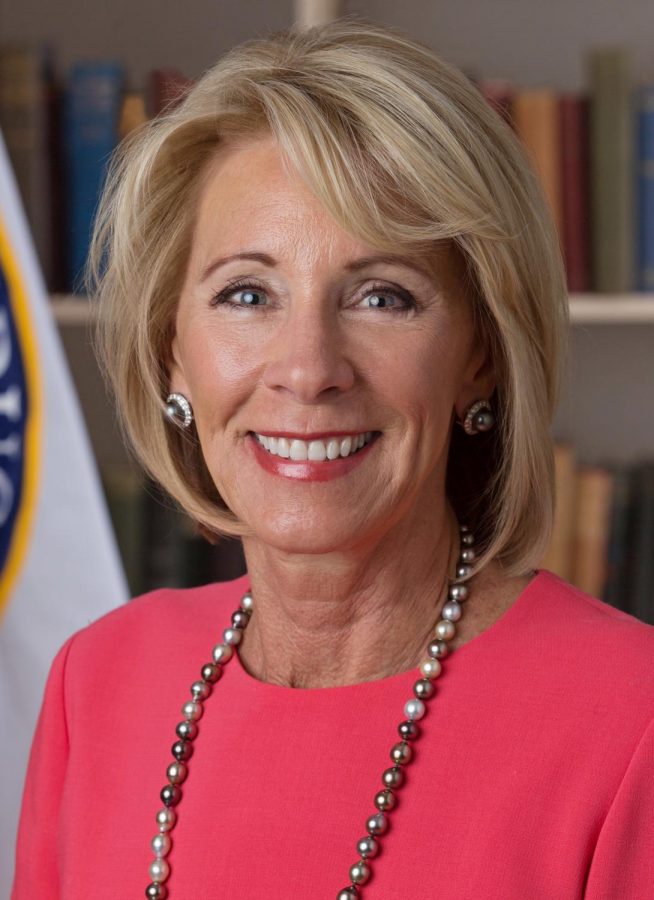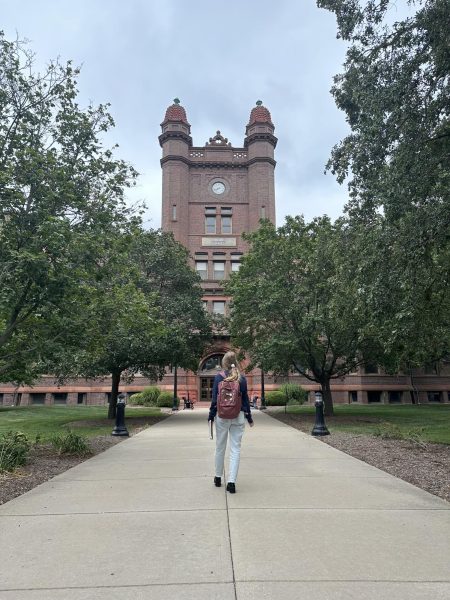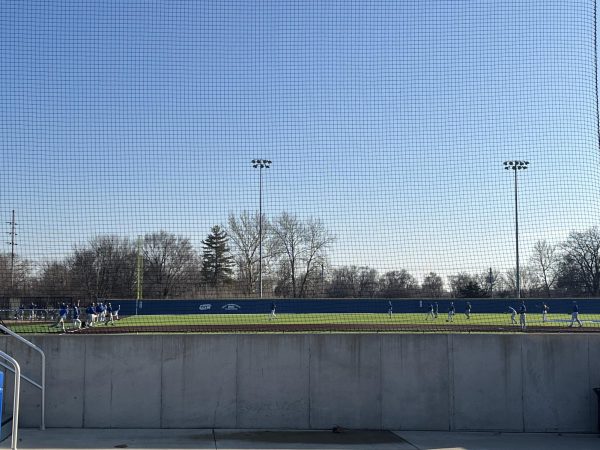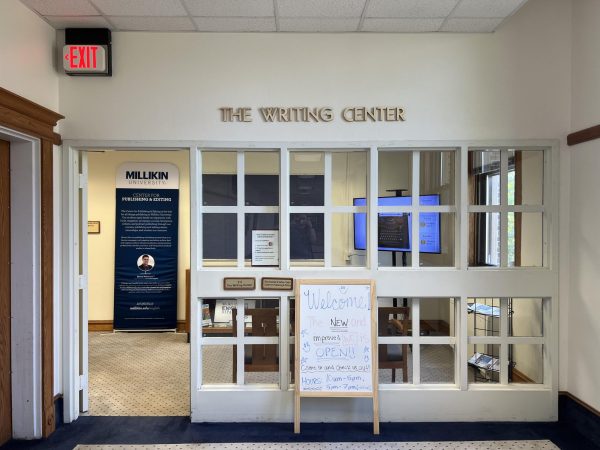Upcoming Changes: What Happens When You Report Sexual Misconduct at Millikin?
Betsy Devos
The conversation around sexual misconduct is set to intensify when new legislation comes into effect next year.
Currently, colleges take a survivor-focused approach to dealing with sexual misconduct. This is a result of a 2011 “Dear Colleague” letter published by the Obama administration. The letter increased protections for victims of sexual misconduct and outlined how colleges should handle these Title IX violations.
Effective Jan. 1, 2020, new legislation will emphasize equity in sexual misconduct investigations conducted by colleges. This legislation, spearheaded by U.S. Secretary of Education Betsy DeVos, will increase protections for the accused student.
“I think it’s like a lot of other things right now in America. The pendulum is swinging too far in one direction, and there’s not a lot of balance or moderation to how things are being viewed or how legislation is being passed,” Raphaella Prange, Dean of Students and Title IX Deputy Coordinator, said. “Some of the changes drastically take how we’ve handled cases from one end of the spectrum to the other.”
One of the biggest changes centers on student conduct hearings. Currently, if a survivor decides to pursue a student conduct hearing, they have to confront the accused student. However, this can be done over the phone or in separate spaces.
But starting in January, the survivor will have to be face-to-face with the accused student during the hearing. Additionally, the accused student will have the opportunity to cross-examine their accuser.
“I think that will be pretty damaging to a survivor’s wanting to report, because that’s just difficult, right? That’s true retraumatization, having to be asked questions about what happened to you in the presence of the person you think did that to you,” Prange said. “But I can only hope that people are still comfortable coming forward and they’ll still use the services and resources on campus.”
Although these changes will emphasize equity, this already plays a major role in student conduct hearings. The university has an obligation to both the survivor and the accused student.
“I do believe in equity in the process, personally. I think that’s really important,” Prange said. “When you’re coming to report something to someone like me, you’re asking me to believe your narrative over another student. The investigation is really designed to help us understand what the truth is.”
While this legislation will change how student conduct hearings are operated, reporting remains the same. Prange explains that there are several avenues through which one can report sexual misconduct. This correlates to the fact that there are a lot of ways that these cases can go.
One way to report is by emailing [email protected]. If a student does this, they will receive an automated email that lists all the available support services. Then, Prange and Chris Ballard, the director of Public Safety, will respond to the student within twelve hours to talk about what comes next.
If the survivor wants to remain anonymous, the Campus Conduct Hotline is a confidential way to report to Millikin. There is an online portal that can be found on the Millikin website under the “Employment” tab, or you can call (866) 943-5787. You don’t have to provide any identifying information unless you want to. At the end of your report, you’ll be given a case number so that you can track the investigation by calling the hotline and providing the number.
There are other options if a student or employee would rather report to someone in person. Prange, Tammy Maxwell, and Diane Lane are all Title IX coordinators, so they know what to do when they receive reports.
Additionally, all faculty and staff at Millikin are mandatory reporters. If they see or hear something, they are required to report it to Prange.
This might sound intimidating. But it means that you can reach out to your favorite professor or another Millikin employee who you trust, and they’ll help get you in contact with a Title IX coordinator.
In the future, Prange hopes that there will also be a reporting feature on the new MU2go app. She is working with the app’s creators to add this feature.
Millikin investigates every report that they receive. After the initial report, Prange brings the student into her office to talk about what they want to do. She also provides information about support services that could benefit them.
Support services might include interim protective measures, such as a campus no-contact order, change of residence, or change of schedule and work assignment.
The Title IX coordinators can also help orchestrate accommodations. These accommodations could consist of extra time to complete assignments, a few days away from campus, and financial assistance for medical or mental health support.
Right away, Prange will usually ask students what their goal in reporting is. Do they want to focus on healing from what happened, or do they want to pursue a student conduct hearing or criminal complaint?
“If you really want to focus on yourself as a survivor, and your ability to move forward, and restoring your own balance, there are lots of things we can do to promote that healing without having you face the person you’re accusing or without you having to retell your story to a million people,” Prange said. “And confidentiality can really be maintained at a more pure level.”
Students who want to process and heal from what happened can utilize resources on campus to do so. If this is the goal in reporting, the next steps are individualized to help the student. Title IX coordinators will work with students to help them get support.
“We can really focus on removing any barrier that student has to getting the help that they need,” Prange said. “It gives me a lot more latitude to be able to advocate on that student’s behalf and talk to faculty and talk to parents and get everyone together on a team to help that student move forward.”
This is one path that students can take. On the other hand, students might decide that they want to pursue a student conduct hearing or file a criminal complaint. If this is what the student wants to do, there are specific timelines and regulations that must be followed.
“When you’re looking at a student conduct process or law enforcement, we certainly want to provide support services, but then we also want to make sure that we’re preserving the integrity of the investigation, too,” Prange said. “So there are certain things that can’t happen at certain times depending on where we are in the process.”
If a student wants to file a criminal complaint, Prange will get Ballard and the Millikin police involved. They take the case from there and help the student through the process of filing a complaint.
Unlike a criminal complaint, a student conduct hearing goes through the university. The new legislation in 2020 will directly impact the operation of student conduct hearings. However, the general process will stay the same.
In a student conduct hearing, the investigation decides whether or not the accused student violated the student handbook. If the accused is charged with a violation of the handbook, they can plead “responsible” or “not responsible,” and they can decide whether or not to request a hearing. If the student pleads “responsible,” or if the hearing ultimately rules that they are responsible, Millikin will decide on consequences for the student.
Often, the university tries to take a restorative approach.
“My goal is always, how can both students move forward with their educational goals?” Prange said. “We’re not a legal system. We’re not the criminal justice system. I don’t put people in jail. My goal is trying to figure out how to help both of these people.”
Clearly, there are several different paths that sexual misconduct cases can follow. The new legislation in 2020 will emphasize equity, but survivors still have a lot of say when it comes to how they want to proceed after making a report.
No matter what a survivor decides to do, Millikin works to provide the support and resources that the student needs.
“I certainly have a lot of empathy for anyone to come forward and say that they’ve been harmed in some way,” Prange said. “And really all I want to do, as someone who’s an educator, is help that person work through that and give them the resources that they need. And I think as humans, especially as humans who have a degree of empathy, you want to remove the pain.”
If you or someone else has experienced sexual misconduct, please consider reaching out to a professor or one of the Title IX coordinators. You have more options than you might think, and there are people who are ready to support you.










